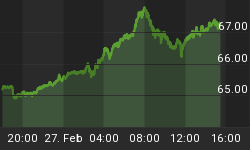Last week we talked about how the US stock market's recent bearish action had spread worldwide.
Today we're going to take a look at where the US markets currently stand, and give you a quick overview of why we think US stocks have entered a bear market.
As a starting note, I should mention that we are basing our definition of a bear market not on the standard definition of an index down 20% from recent highs, but largely on the action of the market according to Dow Theory.
And according to our favorite newsletter writer and Dow Theory specialist, Richard Russell, the market has been in bear territory now for some time, as signaled by the primary bear market confirmation back on November 21, 2007.
That's where we are now. We won't know how long the bear market will last (or how severe it will prove to be), but if history is any guide, it should end in a period of public apathy or disgust towards the stock market and a resurgence of value in the markets, with shares trading at low P/Es and bearing significantly higher dividend rates.
And if you'd like to go by the more popular acid test of 20 percent losses from recent highs, or a violation of trend, we can highlight that sort of news for you as well.
Taking a quick look at the Wall St. Journal's table of major US and global stock market indexes, we see that most of the major index groups are down year to date, with many of the leading averages currently trading at the low end of their 52 week range.
This does not necessarily imply a bear market, but we are already getting to the point where leading indexes such as the Dow Jones Stoxx 600 are down 20 percent from recent highs.
The MSCI World Index is down around 14 percent from its October record highs, and the S&P 500 is down 15 percent from its October high. Many global share markets have dropped 20 percent or more from their recent highs:
"Mexico, Sweden, France, Poland and Australia are among the more than 40 countries whose benchmark indexes have slumped more than 20 percent from their highs of 2007, the common definition of a bear market. Europe's Dow Jones Stoxx 600 Index has tumbled as much as 24 percent from a six-year high on June 1. In the U.S., the S&P 500 dropped 15 percent from its record reached in October."
So as you can see, the situation is not limited to the US (or our imaginations) and worry has been spreading throughout the world's financial markets.
Could we get a rebound later in 2008? Anything is possible, but for now, as Carl Swenlin has noted, "bear market rules apply".















